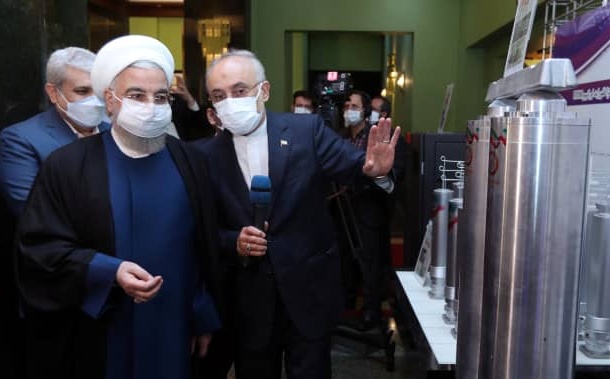Iran President Hassan Rouhani and head of the Atomic Energy Organization Ali Akbar Salehi at an exhibition on National Nuclear Technology Day, Tehran, April 10, 2021
UPDATE, 0815 GMT:
Iran’s Atomic Energy Organization reports an “accident” in the electricity network of the Natanz nuclear enrichment facility.
Spokesman Behrooz Kamalvandi said the accident occurred Saturday morning and is being investigated. There were no casualties or nuclear contamination.
For more than a decade, the US and Israel have tried to limit Iran’s nuclear program with cyber-attacks. Israel has also assassinated nuclear scientists.
Last July 2020, a building at Natanz, one of Iran’s two major nuclear and research development facilities, was damaged in an explosion. The incident, targeting uranium centrifuges, is believed to be an Israeli operation using a local contact at the plant.
ORIGINAL ENTRY: Seeking leverage and a tough pose amid indirect nuclear talks with the US and other powers, Iran has launched another cascade of advanced uranium centrifuges, breaking a key provision of the 2015 nuclear deal.
On Saturday, State TV showed President Hassan Rouhani ordering the injection of uranium gas into 164 IR-6 centrifuges and 30 IR-5 centrifuges, and mechanical tests on IR-9 machines.
Under the 2015 agreement, from which the Trump Administration withdrew in May 2018, Tehran is restricted to IR-1 centrifuges. However, the Rouhani Government has suspended compliance with provisions in the deal since June 2019, responding to the US imposition of comprehensive sanctions seven months earlier.
Iran began restarting IR-4 and IR-6 centrifuges last September. More cascades were established in November and in March, as Tehran limited inspections by the International Atomic Energy Agency.
Rouhani appeared at a ceremony for National Nuclear Technology Day, with 133 advances proclaimed in fields such as medicine, power, agriculture, and energy.
The President took care to say, “All our nuclear activities are peaceful and for non-military purposes….We continue to be committed to our pledge to the Nuclear Non-Proliferation Treaty and to the world not to deviate militarily from our nuclear program.”
Indirect talks between Iran, the US, and the current powers in the 2015 deal (UK, France, Germany, China, and Russia) began on Tuesday in Vienna. They made little advance on the fundamental division between Tehran and Washington: the Biden Administration is proposing a “sequenced” approach, but Iran is insisting publicly on removal of US sanctions before any advance in discussions.
The talks resume on Wednesday.
Rouhani has been criticized by Iranian hardliners for remaining in the nuclear deal, but he said on Saturday, “One of the achievements of the JCPOA [Joint Comprehensive Plan of Action] was that it made Iran’s nuclear technology fully legal and reserved the rights of the Iranian nation.”

